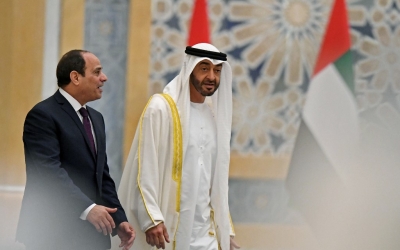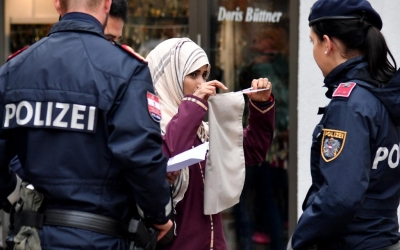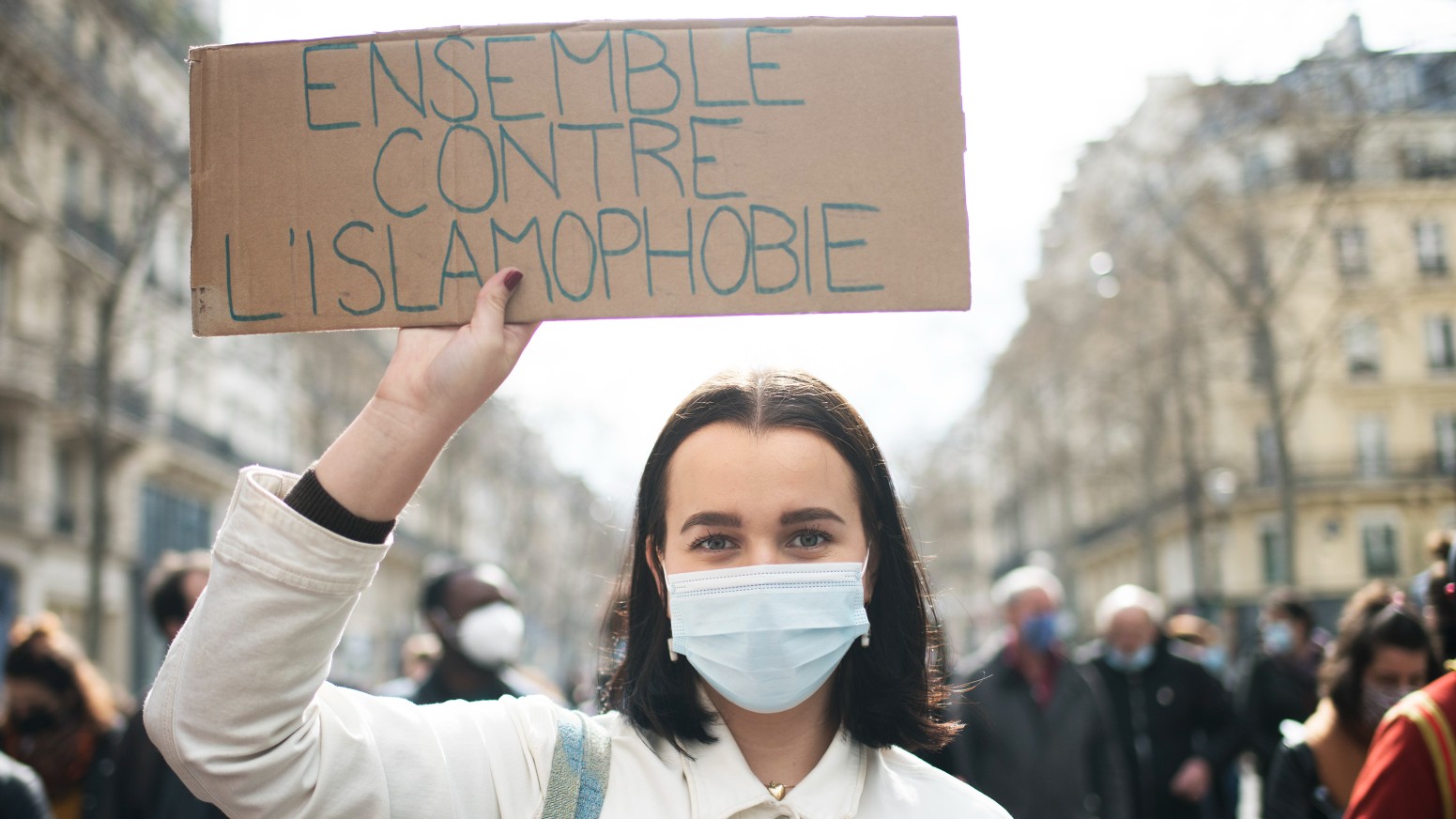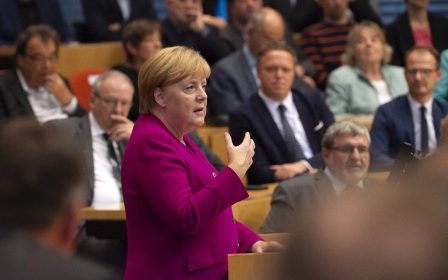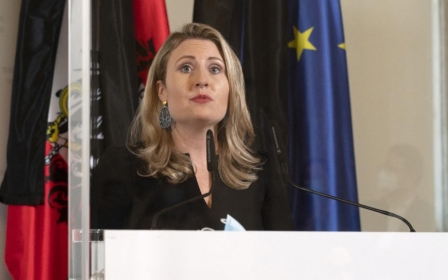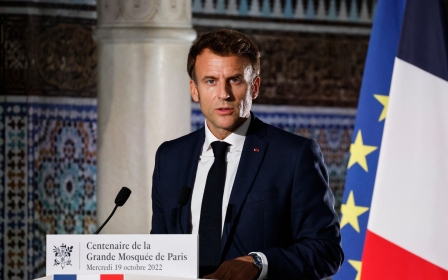Why the UAE is stoking European Islamophobia
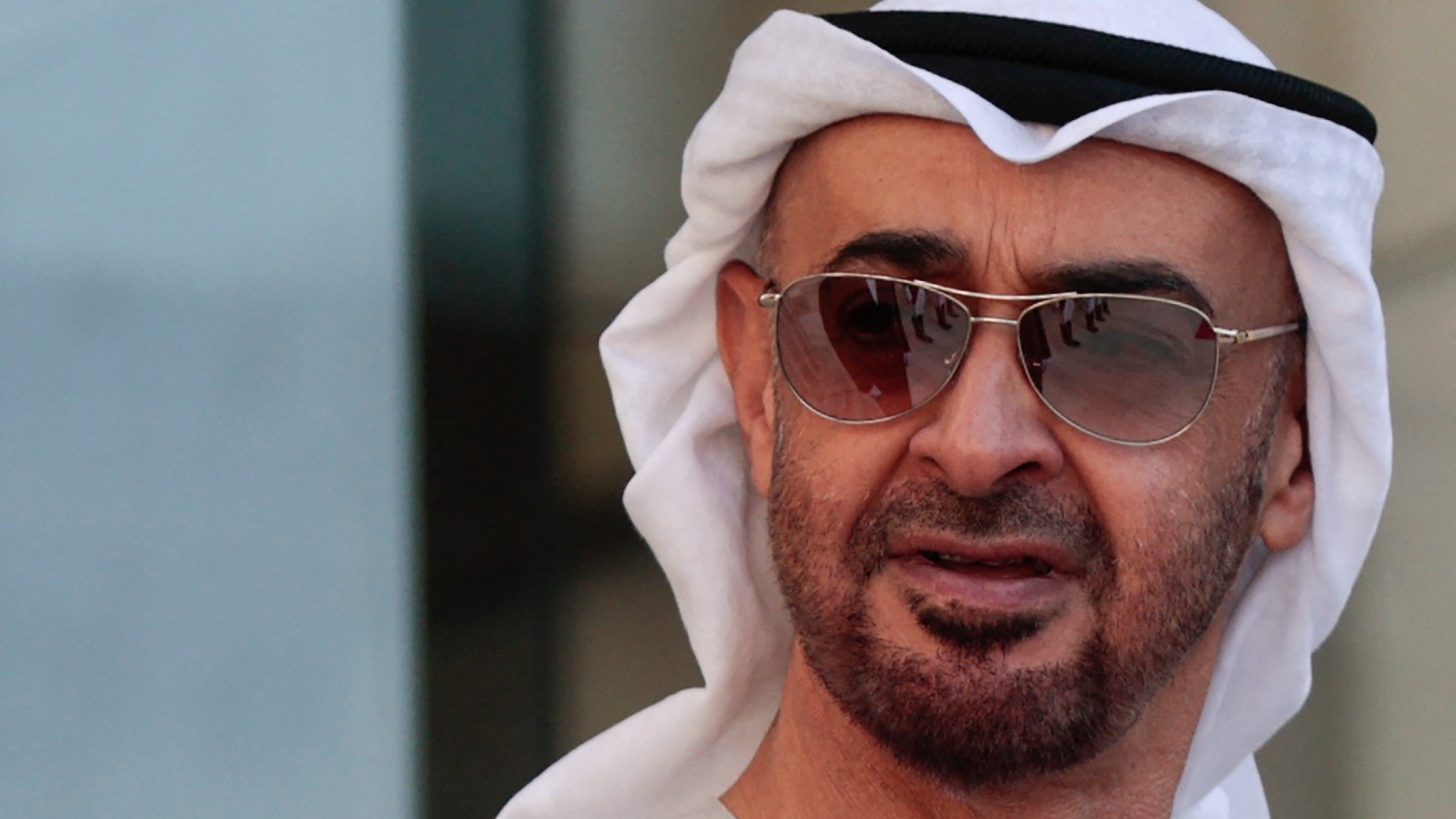
Humza Yousaf has waded through more than his fair share of racist abuse to become the first Muslim and person of Asian descent to take the top executive role in the Scottish government, and lead a major party in the UK.
More than most Muslims, Yousaf has been the target of threats. He had to think hard about the impact that running as one of three candidates for the post of first minister would have on his family.
“It’s one of the long conversations, the hard conversations, that I had with the family who know about the racial and Islamophobic abuse that I get. Ultimately you don’t really worry about yourself too much - you worry about your kids,” Yousaf told The Scotsman.
Compared at one point by a Scottish politician to Abu Hamza, the London imam convicted in the US of the deadly kidnapping of western tourists in Yemen, Yousaf went around with a panic alarm in his jacket pocket.
Within a week of taking the oath in Urdu and English, Yousaf was battling the optics of a police raid on the home of Peter Murrell, the former Scottish National Party chief executive and husband of former First Minister Nicola Sturgeon, in an investigation over party finances.
New MEE newsletter: Jerusalem Dispatch
Sign up to get the latest insights and analysis on Israel-Palestine, alongside Turkey Unpacked and other MEE newsletters
Yousaf’s activism began early on in life, as a volunteer for Islamic Relief at the age of 10. He went on to organise coaches of protesters from Glasgow for Stop the War’s largest rally against the Iraq War in 2003, thus earning himself a place on the radar of Breitbart, the far-right US website.
He became Islamic Relief’s media spokesman before his election to the Scottish Parliament in 2011.
Yousaf and fellow Muslim Anas Sarwar, who heads the Scottish Labour Party, have both battled discrimination and Islamophobia, which are intrinsic to life in the West. These are domestic forces.
Powerful foreign agenda
Yet, there is one powerful foreign agenda at play, which has a completely different motive for stoking Islamophobia in Europe and the US. This campaign has been running for a decade and was launched in response to the Arab Spring, when all Gulf autocrats felt the danger of events in Tunisia, Egypt, Yemen, and for a brief period, Syria.
Its ideologues have swayed government policy, not least in Britain, Germany, Austria and France. Its trolls have destroyed reputations. Its smears have corrupted World-Check, highly secret data the banks use for compliance. Legitimate businesses have been bankrupted.
This campaign is funded by a government with bottomless pockets. And what’s worse, the brains behind it is a Muslim. He is now the president of United Arab Emirates, Mohammed bin Zayed.
On the day of Yousaf’s election as first minister, the New Yorker revealed how the UAE paid a private intelligence firm based in Geneva, Alp Services, to smear Britain’s largest Muslim charity, Islamic Relief Worldwide (IRW), by seeking to link its officials with the Muslim Brotherhood and violent extremists.
Why has the government of a Muslim country attempted to knock the biggest Muslim charity out of existence?
According to the New Yorker, Alp attempted to link Heshmat Khalifa, a member of IRW’s board of trustees, to terrorism, following his work with an Egyptian humanitarian organisation in Bosnia in the 1990s. That attempt failed, but Alp trawled back over Khalifa’s social media history, where they discovered antisemitic posts shared by him after Israel’s attack on Gaza in 2014.
Alp shared this information with the Times in London, which ran the stories. Khalifa resigned and IRW condemned the posts as appalling and unacceptable.
The charity then came under a tsunami of pressure. The US State Department, under former President Donald Trump, encouraged all government bodies to examine “their relationship with IRW”. The Charity Commission in the UK and Sweden’s international development agency launched investigations, while Germany cut IRW’s funding altogether. Banks threatened to stop transferring Islamic Relief funds to crisis zones around the world.
IRW says it has spent hundreds of thousands of dollars to stay in business, funding outside audits and suppressing false information on internet searches. It paid for an independent commission headed by Dominic Grieve, a former attorney general, which found IRW to be a “highly effective charity” free of institutional antisemitism.
Waseem Ahmad, IRW’s chief executive, told the New Yorker that the reputational harm done to the charity affected millions around the world who rely on it: “It just hurt and delayed our humanitarian work,” he said. Asked why the UAE had undermined Islamic Relief, he replied: “That is a multimillion-dollar question.”
It is indeed. Why has the government of a Muslim country attempted to knock the biggest Muslim charity out of existence?
'Offensive viral communication'
In 2014, at the very start of this campaign, the UAE published a list of 86 “terror groups”, which included the Council on American-Islamic Relations. It alleged IRW was a branch of the Muslim Brotherhood, a charge the organisation fulsomely rebuts.
IRW is by no means alone. Alp is the brainchild of Mario Brero, a Swiss investigator who has had brushes with the law in San Francisco and in Switzerland. He has described his speciality as “offensive viral communication campaigns”.
Like the Israeli NSO company, which developed its Pegasus software to tap mobile phones, Brero thought he was selling a service powerful enough to attract heads of state. On 12 May 2017, he boasted to the UAE that “several Head of States” and other “high-net-worth individuals” had made use of Alp’s “capacity to enhance or degrade reputations on the Internet”.
Brero was on a roll. According to the New Yorker, the UAE put him on a retainer of 200,000 euros a month to locate and attack targets across Europe, with additional fees for one-off projects. One of his first moves was to contact an Italian academic who had made a name for himself hunting down the Muslim Brotherhood and linking them to extremist groups.
Lorenzo Vidino directs the Program on Extremism at George Washington University (GWU), styling himself as “an expert on Islamism in Europe and North America” whose research has focused on the “mobilisation dynamics of jihadist networks in the West; governmental counter-radicalisation policies; and the activities of Muslim Brotherhood-inspired organisations in the West”.
The term “Brotherhood-inspired” is carefully chosen, because to falsely accuse a Muslim target of membership would be libellous. Instead, Vidino divides his targets into three categories: “pure Brothers”, “Brotherhood spawns” and “organisations influenced by the Brotherhood.”
Vidino admits it would be a “grave analytical mistake” to lump the Brotherhood’s ideology in with Salafist and jihadist milieus. But in reality, he does just that. In a pamphlet on the Muslim Brotherhood in Austria, published in 2017, he stated that the organisation “promotes a narrative that, through its use of victimhood and justification of violence, creates a fertile environment for radicalisation”.
Western groups that he vaguely describes as “Brotherhood entities” have, according to Vidino, purposely exaggerated anti-Muslim incidents and attitudes - which he admits unquestionably exist - to foster a “siege mentality” within local Muslim communities, particularly in Austria. At the same time, he argues, the Brotherhood sees violence as legitimate where it views Muslims as under occupation, and funds organisations such as Hamas.
Copy and paste
Missing from this “analysis” is the wealth of evidence that Hamas takes its decisions independently of other Islamist groups and that it limits armed resistance to Palestine. As the Shin Bet has acknowledged, the Palestinian national cause plays a far greater role than religion. Jihadists have a short life in Gaza.
Vidino goes on to foster the myth that the Brotherhood creates problems of social cohesion in Europe and - the killer phrase - is “at odds with European values”.
These words have been copied and pasted into government policies in the UK, Germany, Austria and France. Two years before his pamphlet on the Muslim Brotherhood in Austria, Vidino denied a report in the Telegraph that he had been involved in a review of the Brotherhood conducted by Sir John Jenkins.
An Emirati based think tank Ak Mesbar published Vidino's book entitled "The New Muslim Brotherhood in the West".
Vidino told MEE at the time: “I was simply commissioned to do a paper and brief the people conducting the review - as many academics have been asked to do.”
In the same year as the Austria paper, Vidino was quickly picked up by the Emirati government. Leaked emails sent by the UAE ambassador to the US, Yousef al-Otaiba, revealed that he forwarded Vidino’s work to the Emirati foreign minister, describing it as “a paper on empowering the moderate voice of Islam in the US in order to balance and eventually defeat the voices of Islamism”.
Otaiba then arranged a meeting between Vidino and his co-author and his boss Abdullah bin Zaid .
Vidino’s papers were a policy awaiting the next attack in Europe. When gunmen identified as having sympathies with the Islamic State group killed four people in an attack in Vienna in 2020, the Austrian interior ministry went into overdrive, launching the largest raids against alleged terrorists in the country since the Second World War.
Farid Hafez, a visiting professor of international studies at Williams College and non-resident senior researcher with Georgetown University’s Bridge Initiative, was among dozens of citizens detained under suspicion of having links to the Brotherhood.
But the roundup crumbled, lacking any legal basis - a fact confirmed by the Graz Higher Regional Court after several defendants launched objections.
“While the prosecution accused some of those targeted in the raids of belonging to the Muslim Brotherhood, the court pointed out that the Brotherhood is not considered a terrorist organisation in Austria,” Hafez wrote in MEE. After an operation lasting more than a year and half, with more than 21,000 hours of phone tapping and more than one million photographs, no charges were laid.
Criminalising Muslims
But this did not stop the Austrian state’s campaign to criminalise Muslim society. This strategy served two purposes: to cover up for the failure of Austrian intelligence over the attacks themselves, and to build a climate of fear around political Islam, with measures such as the hijab ban and the closure of mosques.
In 2021, the Austrian government launched a “National Map of Islam” showing the locations of 620 mosques and Muslim associations across the country.
“Imagine if we had a Judaism map or a Christianity map in Austria,” Tarafa Baghajati, chairman of the Initiative of Muslim Austrians, told broadcaster ORF.
Austria even created its own road signs, with an image of a menacing Muslim and a warning: “Beware! Political Islam nearby.” Needless to say, this was too much even for the Council of Europe, which demanded the withdrawal of the map.
It does not take 25 years of research to link state-sponsored Islamophobia in Austria, France and Germany to the rising tide of racist attacks on Muslims in Europe
Vidino confirmed to the New Yorker that he had worked for Alp, saying: “It’s the same research I do no matter what, so it does not really matter who the final client is. I am a one-trick pony. I have been researching the Muslim Brotherhood in Europe for almost 25 years.”
Now at last, there are some signs of a pushback. The New Yorker story prompted two American professors to withdraw their affiliation with George Washington University’s programme on extremism.
Hilary Matfess, an assistant professor at the University of Denver and former fellow at GWU’s extremism programme, tweeted: “Before affiliating I should have done my due diligence about the director’s research and professional activities; I didn’t and I regret that. To be extremely clear: I condemn in the strongest possible terms Islamophobia.”
A day later, Cynthia Miller-Idriss, the founding director of the American University’s Polarisation and Extremism Research and Innovation Lab, and former fellow at GWU’s extremism programme, said she wanted her name removed, although she did not hold a paid position.
But the damage has been done. In France alone, Hafez has calculated that “as many as 24,887 Muslim organizations and businesses were placed on a secret blacklist and under strict monitoring, and 718 Muslim-owned organizations and businesses including at least four schools, 37 mosques, 210 businesses, and two organizations were closed. About €46 million [$50m] were confiscated by the French government.”
Racist attacks
It does not take 25 years of research to link state-sponsored Islamophobia in Austria, France and Germany to the rising tide of racist attacks on Muslims in Europe.
Racist attacks against Muslims surged in Austria after the appearance of the Islam map. Germany recorded a spike in attacks on mosques last year, leaving 10 injured and several mosques damaged. In 2020, attacks increased in France by 53 percent, with 235 incidents recorded. In the UK in the year ending March 2022, the Home Office recorded that 42 percent of religious hate crimes targeted Muslims - a total of 3,459 offences.
So back to the question: what has the UAE’s jihad against political Islam achieved? Why is a Muslim government continuing to sponsor and fund a campaign that targets Muslims in Europe, irrespective of their political views or activities?
Mohammed bin Zayed has been forced - by failure - to change his foreign policy. He has lifted the siege on neighbouring Qatar. He now invests heavily in Turkey. At least on the surface, he is making peace with his regional rivals.
And yet, the funding for this pernicious campaign continues. Why? What is to be gained by the UAE from spreading fear, smearing innocent Muslims, wrecking reputations and businesses, spurring white racist attacks on mosques, and ruining the lives of thousands?
What is to be gained from feeding the far right? What is to be gained from ruining effective western counterintelligence by stigmatising whole communities?
It beggars belief that European governments make themselves the willing stooges of an autocrat, who is doing all this for completely different motives than the ones being sold in the UK, Germany, France and Austria. He cares not one jot for the “good Muslim” he claims he is trying to create. He does this for self-preservation, exactly as Russian President Vladimir Putin does.
How fitting it is that Austria should offer itself as the epicentre for Mohammed bin Zayed’s attempts to socially engineer the Muslim community in Europe. After all, it’s the only country where you can still see a statue of the antisemitic former mayor of Vienna, Karl Lueger, who inspired Hitler.
Has the Austrian state learned nothing?
The views expressed in this article belong to the author and do not necessarily reflect the editorial policy of Middle East Eye.
This article is available in French on Middle East Eye French edition.
Middle East Eye delivers independent and unrivalled coverage and analysis of the Middle East, North Africa and beyond. To learn more about republishing this content and the associated fees, please fill out this form. More about MEE can be found here.



